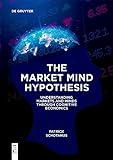The Market Mind Hypothesis : Understanding Markets and Minds Through Cognitive Economics / Patrick Schotanus.
Material type: TextPublisher: Berlin ; Boston : De Gruyter, [2023]Copyright date: ©2023Description: 1 online resource (LXVII, 426 p.)Content type:
TextPublisher: Berlin ; Boston : De Gruyter, [2023]Copyright date: ©2023Description: 1 online resource (LXVII, 426 p.)Content type: - 9783111211619
- 9783111215617
- 9783111215051
- online - DeGruyter
- Issued also in print.
| Item type | Current library | Call number | URL | Status | Notes | Barcode | |
|---|---|---|---|---|---|---|---|
 eBook
eBook
|
Biblioteca "Angelicum" Pont. Univ. S.Tommaso d'Aquino Nuvola online | online - DeGruyter (Browse shelf(Opens below)) | Online access | Not for loan (Accesso limitato) | Accesso per gli utenti autorizzati / Access for authorized users | (dgr)9783111215051 |
Frontmatter -- Acknowledgements -- Foreword -- Contents -- Prologue -- Introduction: Opening a Can of Worms from Pandora’s Box -- Background and Motivation: Mr Market and Me -- Chapter 1 Setting the Stage: Who Am I? -- Chapter 2 On Ontology: Am I Evil? -- Chapter 3 On Theory: Am I Right? -- Chapter 4 On Epistemology: Am I Lucky? -- Chapter 5 On Methodology: Am I Healthy? -- Chapter 6 On Complexity: Am I Emerging? -- Intermezzo: Parallels Between Mind and Market. What is Mind? What is Market? -- Chapter 7 On Discovery: Am I Free? -- Chapter 8 On Portfolios: Am I Balanced? -- Chapter 9 On Empiricals: Am I Verifiable? -- Chapter 10 On the Hard Problem: Am I Conscious? -- Chapter 11 On the Worst Case: Am I Breaking Down? -- Chapter 12 On Closure: Farewell and Good Luck -- Afterword: The Market Mind Hypothesis and 4E Cognitive Science: A Post- Cognitivist Approach to Cognitive Economics -- Abbreviations and Glossary -- Appendix 1 Bridging Concepts and Terms -- Appendix 2 Research Manifesto -- References -- List of Figures -- List of Tables -- About the Author -- Index
restricted access online access with authorization star
http://purl.org/coar/access_right/c_16ec
What is economics’ missing link? Recent economic crises have had a devastating impact on society. Worryingly, they gravely risked a collapse of the financial system. These crises also painfully revealed economics’ blind spots. Crucially, economics is not an innocent bystander but central to the problem. In this pioneering book, Patrick Schotanus explains that economics’ mechanical worldview is the ontological error which leads to flawed thinking and faulty practices. The Market Mind Hypothesis (MMH) thus calls it "mechanical economics": it not only erroneously views but also dangerously treats the economy as a machine, the market as an automaton, and its agents as robots. Inspired by heterodox economic and leading cognitive thinkers, this book offers an alternative paradigm. Central to MMH’s psychophysical worldview is the fact that consumers, investors, and other participants are conscious beings and that their minds’ extension makes consciousness a reality in markets, exemplified by market mood. Specifically, denial of the complex mind~matter exchanges as the essence of markets means the extended mind~body problem is economics’ elephant in the room. The book argues that if mechanical economics is the answer, we have been asking the wrong questions. Moreover, we will not solve our economic predicaments by doubling down on the assumption of rationality, nor by identifying yet another behavioural bias. Instead, scholars and students of economics and finance as well as finance practitioners need to investigate—through cognitive economics—the deep links between markets and minds to better understand both. With a foreword by investment strategist Russell Napier, an intermezzo by neuroscientist and complexity pioneer Scott Kelso, and an afterword by 4E cognition philosopher Julian Kiverstein.
Issued also in print.
Mode of access: Internet via World Wide Web.
In English.
Description based on online resource; title from PDF title page (publisher's Web site, viewed 26. Apr 2024)


